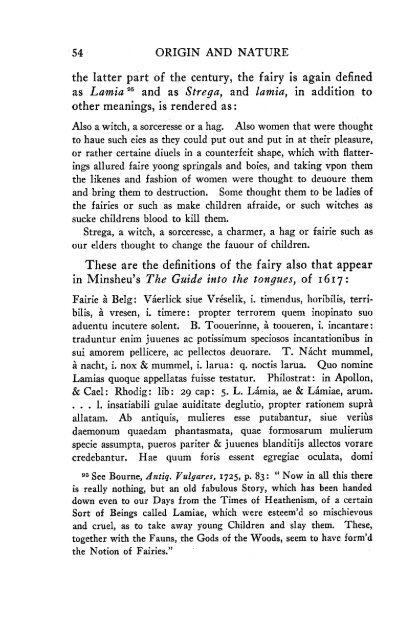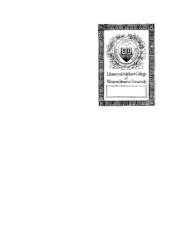THE ELIZABETHAN FAIRIES
THE ELIZABETHAN FAIRIES
THE ELIZABETHAN FAIRIES
Create successful ePaper yourself
Turn your PDF publications into a flip-book with our unique Google optimized e-Paper software.
54 ORIGIN AND NATURE<br />
the latter part of the century, the fairy is again defined<br />
as Lamia g6 and as Strega, and lamia, in addition to<br />
other meanings, is rendered as :<br />
Also a witch, a sorceresse or a hag. Also women that were thought<br />
to haue such eies as they could put out and put in at their pleasure,<br />
or rather certaine diuels in a counterfeit shape, which with flattering~<br />
allured faire yoong springals and boies, and taking vpon them<br />
the likenes and fashion of women were thought to deuoure them<br />
and bring them to destruction. Some thought them to be ladies of<br />
the fairies or such as make children afraide, or such witches as<br />
sucke childrens blood to kill them.<br />
Strega, a witch, a sorceresse, a charmer, a hag or fairie such as<br />
our elders thought to change the fauour of children.<br />
These are the definitions of the fairy also that appear<br />
in Minsheu's The Guide into the tongues, of 1617 :<br />
Fairie 8 Belg: VBerlick siue Vrkselik, i. timendus, horibilis, terri-<br />
bilis, h vresen, i. timere: propter terrorem quem inopinato suo<br />
aduentu incutere solent. B. Toouerinne, h tooueren, i. incantare:<br />
traduntur enim juuenes ac potissimum speciosos incantationibus in<br />
sui amorem pellicere, ac pellectos deuorare. T. NBcht mummel,<br />
B nacht, i. nox & mummel, i. larua: q. noctis larua. Quo nomine<br />
Lamias quoque appellatas fuisse testatur. Philostrat: in Apollon,<br />
& Cael: Rhodig: lib: 29 cap: 5. L. LBmia, ae & LBmiae, arum.<br />
. . . 1. insatiabili gulae auiditate deglutio, propter rationem suprh<br />
allatam. Ab antiquis, mulieres esse putabantur, siue verihs<br />
daemonum quaedam phantasmata, quae formosarum mulierum<br />
specie assumpta, pueros pariter & juuenes blanditijs allectos vorare<br />
credebantur. Hae quum foris essent egregiae oculata, domi<br />
96 See Bourne, Antiq. Vulgares, 1725, p. 83: '' NOW in all this there<br />
is really nothing, but an old fabulous Story, which has been handed<br />
down even to our Days from the Times of Heathenism, of a certain<br />
Sort of Beings called Lamiae, which were esteem'd so mischievous<br />
and cruel, as to take away young Children and slay them. These,<br />
together with the Fauns, the Gods of the Woods, seem to have form'd<br />
the Notion of Fairies."

















